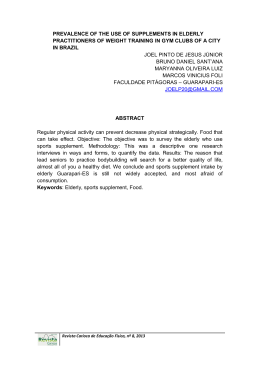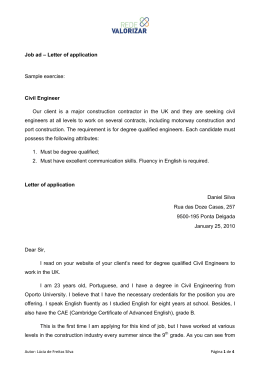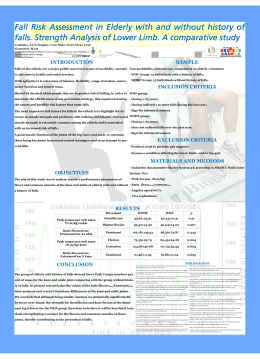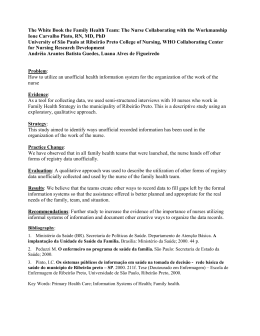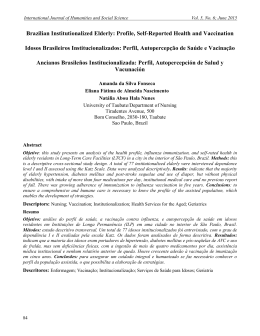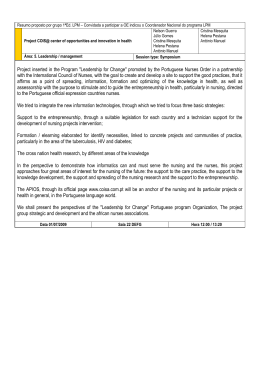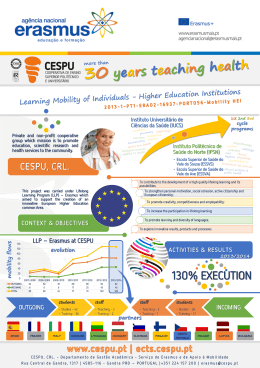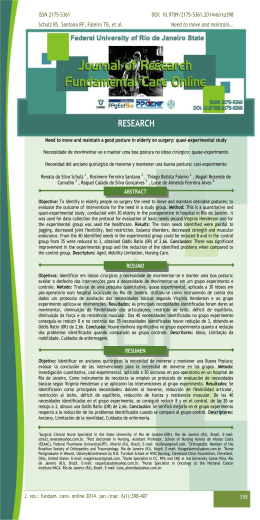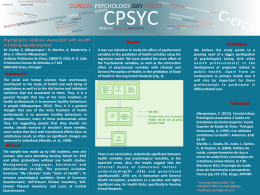PROMOTING ELDERLY HEALTH: NURSING CARE THROUGHT THE GROUP AMOR À VIDA GAUTÉRIO, Daiane Porto 1; VIDAL, Danielle Adriane Silveira2; SANTOS, Silvana Sidney Costa3; PIEXAK, Diéssica Rógia4; ILHA, Silomar5; DIAS, Matheus Viero6; NICOLA, Gláucia Dal Omo7. ABSTRACT This study has aimed at describing the formation of the group Amor à Vida, developed by nurses and nursing technicians in a Local Health Unit (LHU) in a city in southern Brazil. The creation of the group that started its activities in November, 2009, aroused from the experience of situations that exposed the need to develop strategies that addressed the well-being, social interaction, the increase of self-esteem, feelings of respect and appreciation among the elderly. After a year of its beginning there were 25 elderly participants. The focus on groups can contribute to the promotion and protection of health. It is concluded that, in individual consultations, offering guidance and developing process of health education are unsatisfactory, meetings being a complementary space for information exchange and social stimulation. Keywords: Elderly, Support Groups, Nursing. 1. INTRODUCTION In Brazil, the number of people over 60 years adds up to about 21 million. Rio Grande do Sul is still one of the states with the highest proportion of elderly (13.5%) 5. As a result of the aging process, there is a significant growth in demand for health services having in mind that the diseases of older people are, in most cases, chronic, multiple and demanding a more constant monitoring 9. The care for the elderly should aim at them reaching old age with better health status possible, so turning to strategies that enable the healthy life and carrying out the monitoring of indicators to assess the morbidity, the impact of the disease and / or disability on quality of life of older people and their families 1.9. 1 Presenter. Nurse of Rio Grande city hall. Doctor’s degree student at Post-graduation Program in Nursing at Universidade Federal de Rio Grande (PPGEnf-FURG). 2 Nurse. Master’s degree student at PPGEnf-FURG. CNPq scholar. 3 Nurse. Geriatrician. Doctor in Nursing. Professor at PPGEnf-FURG. 4 Nurse. Doctor’s degree student at PPGEnf-FURG. CAPES/REUNI scholar. 5 Nurse. Master’s degree student at PPGEnf-FURG. CAPES/DS scholar. 6 Nurse. Master’s degree student in Nursing at the PPGEnf/FURG. CAPES/DS scholar. 7 Nurse. Master’s degree student in Nursing at the PPGEnf/FURG. CAPES/DS scholar. The adoption of strategies that create supportive environments and promote healthy choices and habits are important at all stages of life and strengthen active aging 7. The collective actions in the community, group activities and participation of users' social networks are some of the resources to act in social and cultural dimensions 8. Thus, the educational activities constitute themselves as an instrument for the promotion of health through the articulation of technical knowledge and popular mobilization of institutional and community resources, public and private initiatives 2. Support groups that use recreational, professional, cultural and / or religious activities are very useful, especially among the elderly 6. This study has aimed at describing the formation of the group Amor à Vida, developed by nurses and nursing technicians in a Local Health Unit (LHU) in a city in southern Brazil. Among the elderly patients who sought care at LHU, we realized that many had low adherence to medication, lack of social, recreational and family interactions, and verbalization of feelings about the actual losses and perceived by the aging process. Many seniors went to the LHU only to find other elderlies and to talk to the health care team. From this fact it was decided to work together with older people, because there were experience situations that aroused the need of developing strategies that addressed the well-being, social interaction, the increase of self-esteem, feelings of respect and appreciation among the elderly. The formation of the Group: a challenge for health promotion for older people attended During the month of August 2009 nurses met with the staff and health workers at the LHU, to discuss the formation of the group, believing that all professionals are important in mobilizing people in the community. In September and October, we conducted the presentation of the project to the elderly group that attended the programs of Systemic Arterial Pressure (SAP) and diabetes mellitus (DM), in order to invite them to participate in a meeting with the LHU nurses. In November, there was a first meeting, which had the presence of 12 seniors, and we clarified the proposal of the formation of the group as a strategy to care for health promotion, and it was well accepted by them. During the meeting, a verbal contract was signed, being chosen, along with the elderly, the activities that would be carried out (physical activity, recreation and workshops), as these confirm the recommendations of the literature and their own needs that were discussed with them. Before starting the group's activities, we asked the elderly to carry out consultations with the doctors of the LHU to assess suitability for physical activity (walking and stretching exercises). Then, we set the starting date of the first activity (November 2009), with day and time, according to the availability of the elderlies, Wednesdays from 8:30 a.m. to 10:00 a.m. The meetings would take place at the Association of Residents of the neighborhood that is located next to the LHU. The walks were carried through the streets of the neighborhood which has awakened the interest of older community to participate in the group. Regarding other activities, we followed the schedule of holidays (Mothers’ Day, Fathers’ Day, June festivals, Carnival, Elderly day, Christmas, among others). The workshops were held from topics chosen by the group and took place once a month. In the first activity held 15 individuals attended. In one month we had 30 elderlies. This occurred because the participants began to report a positive activity, both within the family and in the health unit (waiting rooms), encouraging people to look for the nurses so they could engage in the group. Thus, the group is no longer linked to patients with SAP and diabetes, receiving new elderly with or without chronic degenerative diseases, but who shared similar problems due to the aging process, and also because they are inserted in the same social context. After two years of activities, the group now has the participation of 25 registered seniors. The elderly members of the group are registered in a form, with data for age, sex, health problems and updated data from past medical and restrictions on physical activity. This feature facilitates the monitoring of the group participants. Importantly, the nurses act as facilitators, allowing the group to make decisions about the programming of activities, from selecting the group name (Amor à Vida) to the places to be visited and the activities to be developed. Importance of Group Amor à Vida to promote the health of elderly The focus on groups can contribute to the promotion and protection of health. It is concluded that, in individual consultations, offering guidance and developing process of health education are unsatisfactory, meetings being a complementary space for information exchange and social stimulus2. The groups facilitate the exercise of self-determination and independence, therefore acting as a network of support that mobilizes people in search of autonomy and life sense and self-esteem. The interaction between people creates bonds that enable the emergence of organizations or at least their incentive, promoting social inclusion 7. The groups represent not only an area of health education but also a source of encouragement to the local organization, for facilitating the exercise of citizenship. They are an alternative to the elderly resume social roles and / or other activities of the occupation of free time and social and interpersonal relationships. The groups join people with similar difficulties and allow the living, a fact of great importance since the loneliness is a common complaint among the elderly. 4 5. FINAL With the increasing demand of the elderly in health services it is needed to be aware of the quality of care provided to this population. Professionals responsible for caring for the elderly need to seek foundation for their practice so that the relationship with that one reflects in the quality of life. The care for human beings, at all stages of life, cannot afford only the biological level, since health is not addressed only by physical issues. The multidisciplinary team that assists the elderly, especially in the community, should use appropriate techniques so that their work reaches its goal. The assistance provided by the nursing work in groups of living can be a suitable tool for this purpose. It is a strategy of facilitating the link between health professionals and users and this can positively affect treatment adherence and prevention measures. Meeting the people who are being assisted is important because it is from this knowledge that we can formulate specific interventions to identified problems. REFERENCES 1. Brasil. Ministério da Saúde. Diretrizes Operacionais dos Pactos pela Vida, em Defesa do SUS e da Gestão. Brasília: Série A. Normas e Manuais Técnicos, 2006. 2. Buss PM. Promoção da saúde e qualidade de vida. Ciência Saúde Coletiva. 2000; 5(1): 163 3. Chacra FC. Empatia e comunicação na relação médico-paciente: uma semiologia autopoiética do vínculo. [thesis]. Campinas (SP): Faculdade de Ciência Médicas/UNICAMP; 2002. 4. Garcia MAA, Yagi GH, Souza CS, Odoni APC, Frigério RM, Merlin SS. Atenção à saúde em grupos sob a perspectiva dos idosos. Rev Latino-am Enfermagem 2006 março-abril;14(2):175-82 www.eerp.usp.br/rlae 5. Instituto Brasileiro de Geografia e Estatísticas (IBGE). Síntese de Indicadores Sociais. Rio de Janeiro. IBGE. 2009. 6. Moreira MMS. Trabalho, qualidade de vida e envelhecimento. [dissertation]. Rio de Janeiro (RJ): Escola Nacional de Saúde Pública; 2000.] 7. Oliveira JCA, Tavares DMS. Atenção ao idoso na estratégia de saúde da família: atuação do enfermeiro. Rev Esc Enferm USP. 2010; 44(3):774-81 8. Oliveira TC, Araújo TL, Melo EM, Almeida DT. Avaliação do processo adaptativo de um idoso portador de hipertensão arterial. Rev Latino-am Enfermagem 2002 julho/agosto;10(4):530-6. 9. Victor, Janaina Fonseca et al. Perfil sociodemográfico e clínico de idosos atendidos em Unidade Básica de Saúde da Família. Acta paul. enferm., São Paulo, v. 22, n. 1, Feb. 2009.
Download
